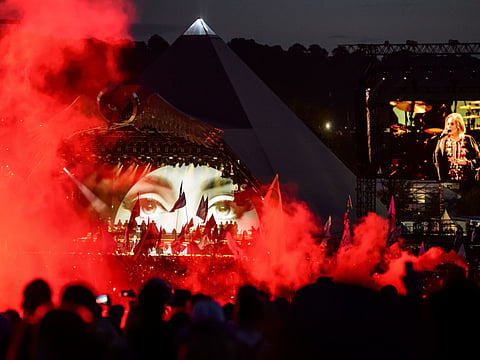Adele charms with headlining set at Glastonbury
The emotional singer-songwriter wows audience, despite lack of upbeat, happy songs

Adele as Glastonbury’s Saturday night headliner is an intriguing choice. On the one hand, it feels like a coup for the festival: she’s unequivocally the biggest pop star in the world at the moment. On the other, as she herself notes early on in her set: “I don’t have a lot of upbeat, happy songs, which is why I think people were annoyed at me playing. But [expletive] them, eh?”
The audience seem to agree: up against fairly stiff competition around the site, including New Order and James Blake, the crowd is immense, even by Pyramid Stage headliner standards. Adele herself seems genuinely and rather touchingly overwhelmed; she lets out a squawk of “[expletive] ‘ell” midway through the opener, Hello — its lyrics amended to mention the festival — and, for the first few songs at least, she confines her on stage chat to mutters of “this is mad”, before announcing that it’s “the best [expletive] moment of my life”.
She talks about visiting the festival when she was seven and shows a clip of her first performance here — in the Guardian’s Live Lounge tent nine years ago, to a handful of people.
As it turns out, her performance works really well. There’s something endearing about the vast contrast between Adele the singer — slick and professional, and, almost uniquely among mega-selling divas, not given to rococo embellishments — and Adele the person who speaks into the microphone between songs, who swears so profusely that, she proudly announces, the BBC have had to put a warning out about her language before broadcasting the show live, and who inquires about the state of the front row’s bowels.
She puts up quite a charm offensive: plunging into the crowd and reappearing wearing a fez; addressing them as “my darlings”; dragging audience members onstage for selfies; appearing to be on verge of tears when the crowd raise their mobile phones during her cover of Bob Dylan’s Make You Feel My Love.
The set, meanwhile, is comprised almost entirely of hits, the familiarity of the songs ameliorating the almost total lack of anything you can dance to, a potent version of Rolling in the Deep notwithstanding. If rolling out the baby photos on the big screens during When We Were Young feels a bit mawkish, her Bond theme Skyfall and Set Fire to the Rain both sound gripping and dramatic.
Adele also gave a masterclass on how to combat nerves. She stops River Lea because she’s “out of breath from all this dancing” and when she falls out of time later on she just starts shouting “[expletive]” while she’s singing. As she says: “If you’re going to [expletive] up a song, you might as well do it during a headline set at Glastonbury.”
She ends with Someone Like You, leaving the stage before the song ends. There’s no encore. It’s her most famous track, but in a way, it’s still an oddly downbeat conclusion: going out not with a bang, but a sombre piano ballad, albeit one that turns into a vast communal singalong. But the audience don’t seem to mind: they drift off into the night, still singing the chorus en masse.


